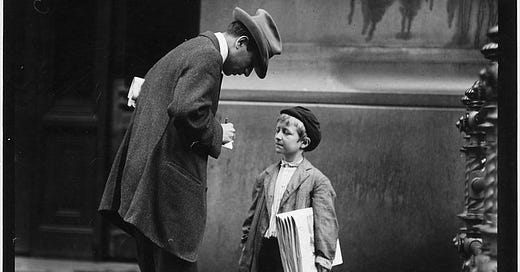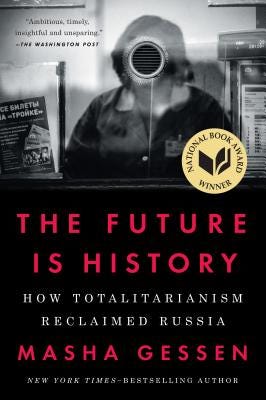Why you'll get more informed from books than the news
The anti-doomscrolling cleanse, and why longer-form writing makes you more informed than just reading or watching the news.
Consider this possibility for a second: Watching the news every day is making you less informed about the world.
This is not to say you don’t understand what’s going on in Ukraine. It’s not to say you aren’t up to date with which basic democratic right the Worst Supreme Court in History™ is dismantling at this very moment. It’s not to say you don’t know the names of most of the major world leaders. It’s not to say you don’t fully understand what’s going on with Silicon Valley Bank and its fallout.
It’s just to say that very little of this knowledge actually helps you in navigating your way through the world.
I’ll explain.
A few years back, I got into a debate with a close friend of mine about immigration. He’s a liberal guy, but he still believed that immigrants should “get in line” and that illegal immigration was bad.
This is a bad topic to get into an argument with me on: I wrote my master’s dissertation on immigration and worked at a pro-immigrant non-profit for several years. We got into it.
At some point during the debate, I realized my friend wasn’t misinformed — he had perfectly reasonable arguments, he wasn’t saying much that was objectively false, but I kept having to stop to explain contextual reasons for my positions to him. He did not, for example, know that much of modern border policy was predicated on a 1924 political deal which threw a bone to powerful white supremacist groups. He did not know about the US and CIA’s role in creating the devastating economic and political conditions in Central America and Mexico. He did not know very much about NAFTA, about the Drug War, about the economics of immigration, or about the basic structure of the modern immigration system for the undocumented.
At some point we gave up. It was a futile argument and it was only creating friction between us. I left disillusioned: my friend, I knew, was relatively well-informed. He read the news, he paid attention to global events. Why was that not enough for us to come to an understanding?
The news cycle is broken
Let’s set aside a few small things, like the corporatization of the news media, right-wing ownership of local news channels (see the John Oliver video above), and the rise of fake news on the internet. There is a problem with the basic structure of news, and it is in the name.
News media is structured around breaking information, and different outlets are aware that they need to get access to or knowledge of that information first if they want to stay relevant and successfully compete within the field. Given the 24-hour news cycle — which is now competing with literally millions of amateurs on the internet — this means that the dump of information has to be rapid-fire and constant.
It does not leave much space for context. While there are some internet-based outlets like Vox Media and the Intercept which focus on context-heavy “explainer journalism,” most news outlets do not dedicate much airtime or many sentences to diving deep into the historical context of current events. And this, it turns out, is vital for understanding an event.
For example: What do you know about Putin’s Russia? Do you know why he invaded Ukraine? Is it because he’s a “madman”? If that’s the case, how does he explain his justifications to the nation of people he leads that broadly support the war?
I’ve been obsessed with the Cold War for years now, and if you get into Cold War history, you eventually will come across Masha Gessen’s excellent The Future is History: How Totalitarianism Reclaimed Russia1. This book follows the trajectory of the country through the lives of 6 people, from 1984 through the collapse of the Soviet Union, the regime of Boris Yeltsin, to the rise of hitherto unknown Vladimir Putin, to his modern-day crackdowns on homosexuality and political dissent.
This book did more for me to frame Russia’s role in the 2016 election, the invasion of Ukraine, and even the western resurgence of anti-LGBTQ rhetoric than any thinkpiece or Op-Ed has. And it’s because, in over 500 pages, Gessen has the space to actually tell a nuanced story. She can connect the dots between the Communists and the KGB to the modern day Russian kleptocracy. She can portray the trauma of being a Russian in the chaotic years after the collapse, and the intense nostalgia for a time when it felt like someone was in control.
In skipping the news about battles in Ukraine, about statements made by Zelenskyy or Biden or Putin, I was able to read this book, and in doing so, I feel that I can wrap my head around the war a lot more than I ever could with the information dump I get from the news media establishment.
There are 18 copies of this book available in my local library system. None of them are checked out.
The Anti-Doomscrolling cleanse
Beyond the fact that longer form writing gives you more context and nuance, it also makes you far less depressed about the state of things. This is because the news relies heavily on a negativity bias to grab your attention: you are, by evolutionary necessity, built to pay more attention to negative information than positive information.
This in itself isn’t a bad thing: it makes sense to pay more attention to the tiger lurking in the bushes than the beautiful butterfly flitting by.
But media seizes on this preference as a way of holding and keeping your attention, and it means that, when all of your news is short-form and delivered via algorithm, you’re going to get a lot of super negative shit.
Longer form writing may be depressing, but it needs to employ more tools than just negativity to keep your attention over hundreds of pages. It needs to keep your curiosity piqued, and this is impossible to do if you’re feeling beaten down and depressed. This is why even when you read books that are about dark topics — say Elizabeth Kolbert’s The Sixth Extinction — you still come away feeling like there are solutions, like there’s hope.
Now: if you believe you don’t have time for books, I have good news! You probably do! It’s all the time you spend reading, watching, or listening to the news!
Local library systems now have access to massive catalogs of non-fiction audiobooks, thanks to the existence of platforms like Libby and Hoopla, and these can be played off of your phone just like podcasts during your commute or while you are making your breakfast. These same apps also offer eBooks, which, I have good news, are just as easy to open as your email or the Twitter app2.
Unlike social media, longer-form journalism and non-fiction are not specifically designed to be addictive, which means that this is all a bit easier said than done. The satisfaction that comes from long-form reading is a slower burn, but it is ultimately a greater one than the short dopamine hits you get from most online content. And if we really want to reach a point where we’re informed about the world, where we choose solutions-based thinking and political empowerment over the overwhelming onslaught of context-free informational chaos that comes from the news cycle, then we have to choose to resist the addiction and go for deeper knowledge.
As per usual, this is an affiliate link to Bookshop.org. If you buy through that link, I get a small kickback, which is helpful.
If you’re trying to read more, I’ve written tips on that as well!





